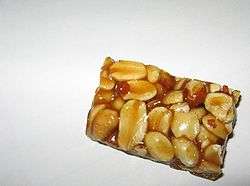Pé-de-moleque

Pé de moleque (Portuguese: [ˈpɛ dʒi muˈlɛki]) (literally "boy's foot" in Portuguese) is a traditional candy from the Brazilian cuisine made of peanuts and jaggery or molasses. The origin of its name lies in the fact that most paved streets of colonial Brazil were made by laying down various odd rocks in a loose layer of sand, and having street children stomp on them to flatten the surface. While cobblestone streets are called rua de paralelepípedos and unpaved streets rua de barro (literally, "clay street"), those made by the method described above came to be named pé de moleque. Since the appearance of the peanuts stuck together by molasses was found to be similar to that of these type of street, the candy took the same name.
 |
| Part of a series on |
| Brazilian cuisine |
|---|
| Types of food |
| See also |
|
The candy is prepared by mixing roasted, peeled peanuts with melted brown sugar or rapadura, with or without the addition of macerated peanuts as well. The mixture is gently stirred over low heat until it gets close to crystallizing. Then the mixture is placed on a plain stone or metal surface (preferably thinly oiled with butter to ease removal) in pieces similar in size to cookies. This traditional preparation results in soft, irregularly-shaped sweets of a dark brown color. Softness results from the incorporation of peanut oil.
Besides the traditional process, this candy is also produced industrially, by mixing melted sugar with peanuts and then pouring the mix into square molds, resulting in hard bars of a lighter color.This variety is also called chikki in India.
See also
- Chikki
- Ka'í Ladrillo
- List of Brazilian sweets and desserts
- Peanut brittle
- Torrone
- doce de amendoim